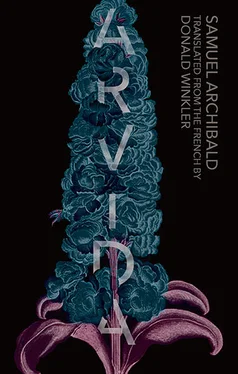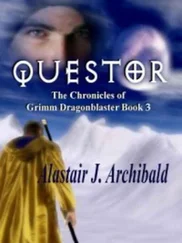Even if I still, today, have a lot of sympathy for D., I’m even more enamoured of the abyss opened up by that reply.
Was it possible that D.’s father wasn’t dead?
Had they actually found his body under the Shipshaw Bridge?
I left for Montreal before my brother could tell me the rest, if there was any more to tell. I often, from afar, thought about this mystery, like a fat detective in the pages of a yellowed crime novel.
The most plausible solution I found was that there had been a case of mistaken identity before the meal. D. was not an extremely common family name in the Saguenay, like Tremblay, Girard, or Bouchard, but it wasn’t rare either. It was perfectly possible that what with the rumour mill and distant memories, his father-in-law had imagined that D. was the son of a D. who was not his father.
That explained the reappearance. It also explained how a man who claimed to be an old friend, and who had maintained close ties in the region so as to eventually return there, could have utterly failed to hear about the death notice.
Of course, that dispensed with the misunderstanding at the expense of the story. On the other hand, you could invent hundreds of stories and as many different fathers for D., to compound the problem. You could invent for him a fraudster father on the run, a gangster father turned Crown witness, a spy father, an amnesiac father, a father abducted by extraterrestrials, a father in the Foreign Legion, a homosexual father prey to a blackmailer, a serial killer father, an alcoholic or drug addict father, or, my favourite, an amateur existentialist who had vanished from view and founded elsewhere a new family just like his old one, to put his personal freedom to the test.
On the one hand I’m doing away with the mystery by providing a lacklustre ending. On the other I’m appropriating it and reducing it to nothing through the practice of fiction (and facile fiction, to boot). To tell the story is already to rob it of its power and fascination. For me it all ends just where it began, with the disclosure of a return from the dead that gives rise to an abundance of hypotheses, but none so presumptuous as to shine a glaring light onto this ghostly marvel.
Nothing made writing more difficult for me than this fundamental impossibility. Like the anti-madeleines of my father in which all memory is swallowed up, the stories I like are untellable, or suffer from being told, or self-destruct in the very act of being formulated.
I once talked about this to my father.
We were at a fishing camp in the Valin Mountains.
In the dark, outside, there were insects and animals and plants to which the moon had lent a different colour than what was theirs in the light of day. In the beam of a gas lamp, in the light, there were only the two of us, my father and me.
It was late, and we were two-thirds of the way through a bottle of Johnnie Walker. As was usual in such circumstances, my father wanted me to explain to him things I was too drunk to elucidate. This time he was asking me questions about writing. He wanted to know why I sometimes arrived with my baggage full of bits of stories and beginnings of novels, and why sometimes, for long years, I didn’t write a line. I said:
“It’s not as easy as that.”
“What’s so hard? I know thousands of stories. If I could write I’d write all the time.”
“Yes, but you wouldn’t know so much about it if you spent your time reading other people’s books.”
“People who know stories can’t write them, and people who can write them don’t have enough stories. It’s not fair.”
“I know lots of stories. It’s not that that stops me.”
“What then?”
“It’s telling them that’s the problem. I can never find a way to put what I want into the stories.”
“I don’t understand.”
“You know Proust?”
“French author of In Search of Lost Time . Six letters.”
“Right. That thing there is an Everest. Something like four thousand pages. In it, the narrator tastes a madeleine at the beginning, and that brings back all his childhood memories. Can you imagine? The guy got a whole world out of a cookie.”
“A madeleine is not really a cookie.”
“I know. But I don’t have anything close to that. I have no madeleine. All we wanted, when we were kids, was McDonald’s.”
“I remember. The kids’ games outside and the smell of French fries in the car.”
“And McNuggets. I feel like all our stories end at the table, rather than start there. The only story that comes back to me from taking a bite of something has to do with a mouthful of McNugget. I was ten years old, and we were celebrating my birthday in the basement of McDonald’s in Jonquière, in the children’s room. I took a bite out of a McNugget, and Julie Morin asked me to give her the rest. At the age of ten, offering her the chewed up half of a McNugget was like offering her an engagement ring, or something like that. I was head over heels in love with her. I blushed, and held out the McNugget to her, and she smiled at me.”
“Did she eat it?”
“She didn’t have time. There were ladders on the ceiling, you remember? Laurent-Pierre Brassard was like a monkey on them. There was something intoxicating about walking like that on the ceiling, but playing the monkey, he’d got tired. He was just over us when his fingers slipped on the rung of a ladder. Before Julie could take her McNugget, Laurent-Pierre fell on top of us, and there was food everywhere, tables overturned, and pop on the floor. Julie Morin cried, and our engagement was off.”
“Is all that true?”
“I’d be surprised. Honestly, after a while you can’t tell a real story from an invented one any more, but I know that’s all the literature I’ll ever get out of a McNugget. And that’s where I always end up. McNuggets aren’t madeleines, forgetting trumps memory, and you can’t write all your life about how hard it is to tell a story.”
“Why not?”
I shrugged my shoulders. My father sighed deeply, as if to say “You’re complicated, you young people.” He went to get us each a beer from the old Coke cooler, to wash down the scotch. While he was shutting the door, his face lit up. He began to tap on his temple with his fingers, which resonated on his skull like on wood, a favourite ploy of his when he wanted you to know there was something going on inside.
“You forget one thing, coco.”
“What?”
“Your grandmother.”
“Éliane?”
“No. My mother.”
“What?
“Her name was Madeleine.”
For an instant, I thought about the Sophie cakes that Mado made with sugar and cream that never set, the banana bread, the little squares of white cake on which she poured boiling hot butterscotch and a dribble of cream. I thought of the hares my grandfather skinned himself in the garage, and that my grandmother cooked like an Indian. I thought of a million things, but above all of Mado herself, her smell, her voice, her smile and her tiny eyes behind thick lenses. With those memories came the memories of dozens of stories I could tell, one way or another, or any old way if necessary.
Stories of Arvida and elsewhere.
Horrible stories and funny stories and stories both horrible and funny.
Stories of road trips, little thieves, and people weak in the head.
Stories of monsters and haunted houses.
Stories of bad men, as men often are, and mysterious and terrifying women, as women always are.
True stories I’d tell without asking permission or changing any names, while giving dates and the names of streets.
Terrible stories that I’d never tell except by removing them to the opposite end of the world, or disguising them in strange language.
They all jostled together, taking their time, until I succumbed to the overwhelming fatigue of a day in the open air. There was no hurry. I hugged my father, I pissed outside, and I went to bed early for once, happy to know so many stories.
Читать дальше












